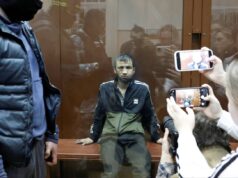Diplomacy hasn’t curbed Iranian nuclear expansion, former United States Treasury analyst Jonathan Schanzer said Monday.
Schanzer, the director of the Jewish Policy Center, a think tank located in Washington,
D.C., addressed terrorism financing to an audience of 30 at the Fox School of Business at an event sponsored by Temple Students For Israel.
During his speech, Schanzer advocated freezing the assets of Iran and other state sponsors of terrorism.
“We’re worried about Iran’s support for Hezbollah,” said Schanzer, who also edits the Jewish Policy Center’s quarterly issue of InFocus, a magazine designed for a younger generation of readers who are curious about the Middle East.
“It gives about $100 million a year to this terrorist organization just to basically attack Israel, and that’s it. They’re also giving money to terrorist funds in Iraq,” he said.
Schanzer said restraining Iranian cash flow won’t truly harm the nation until the international community joins in. He linked the unwillingness to constrict Iran’s economy to a dependence on oil.
“Why is the rest of the world not ready to impose sanctions on Iran? One word, three letters,” he said. “Gas. Our European allies, misguided as they are, have decided that they do not want to cut off ties with Iran because they don’t want to watch the price of oil go careening upward.”
Schanzer also targeted Syria and Saudi Arabia as state sponsors of terrorism. He said financial leniency toward these countries has yielded another enabler of terrorism: the United States.
“[Syria] continues to tell America that it wants to work with us, so we haven’t been too strict with them,” he said. “We’re going to continue to allow them to funnel money into Iraq and into Lebanon and into the Palestinian authorities.”
He added that Saudi Arabia’s part in terrorism comes from its funding of mosques that support a radical version of the Koran. He estimated that 20 percent of the Muslim population supports this radical interpretation that drives terrorism.
“That’s 340 million people who seek to destroy the United States, who seek to destroy Israel, who seek to destroy the system we now thrive in,” he said.
Schanzer expressed frustration with the U.S.-Saudi alliance.
“We needed to get ourselves off oil yesterday, maybe last week,” he said. “When I was working in the Treasury, there was a constant fear of saying too much to the Saudis because we need their oil.”
Schanzer said that American universities and media outlets that downplay the role of radical Islam have indirectly supported terrorism as well.
“They’re putting America to sleep,” he said. “You need to have strong voices who understand the Arab world and the beauties of Islam but who can condemn these murders without question.”
He added, “I think that if you start to get rid of the people who explain how terrorism needs to be understood, you start to get rid of the problem … [Our] idea is to take back some of the college campuses.
“I think it really starts with kids.”
TSI, a campus organization which promotes the existence of a peaceful Israeli state, planned and helped facilitate the lecture. Many of its members said they found educational value in Schanzer’s message.
“I found him very informative,” said Gil Cnaan, a senior religion and political science major. “As someone who’s done research into these topics, I thought he was spot-on.”
Director of Jewish Studies Laura Levitt said she supported the dialogue that arose from the event but disagreed with some of Schanzer’s sentiments about apologia in Western universities.
“When you hire professors on campus, you don’t have someone sign an agreement with you before you let them speak,” she said. “I think that the speaker has a more ideological position than mine and we’d probably disagree with who we feel comfortable talking to.”
Levitt also questioned his figures.
“I don’t think that 20 percent of Muslims are radicals,” she said.
“I don’t think it’s as important to think of where the speaker stands in his own political beliefs,” said TSI vice president Sarah Bassman, a junior broadcast telecommunications mass media major. “As students, you never know what you’re going to gain. It’s more important to think about that than ‘Who is this guy?'”
Mel McKrell can be reached at melissa.mckrell@temple.edu.





